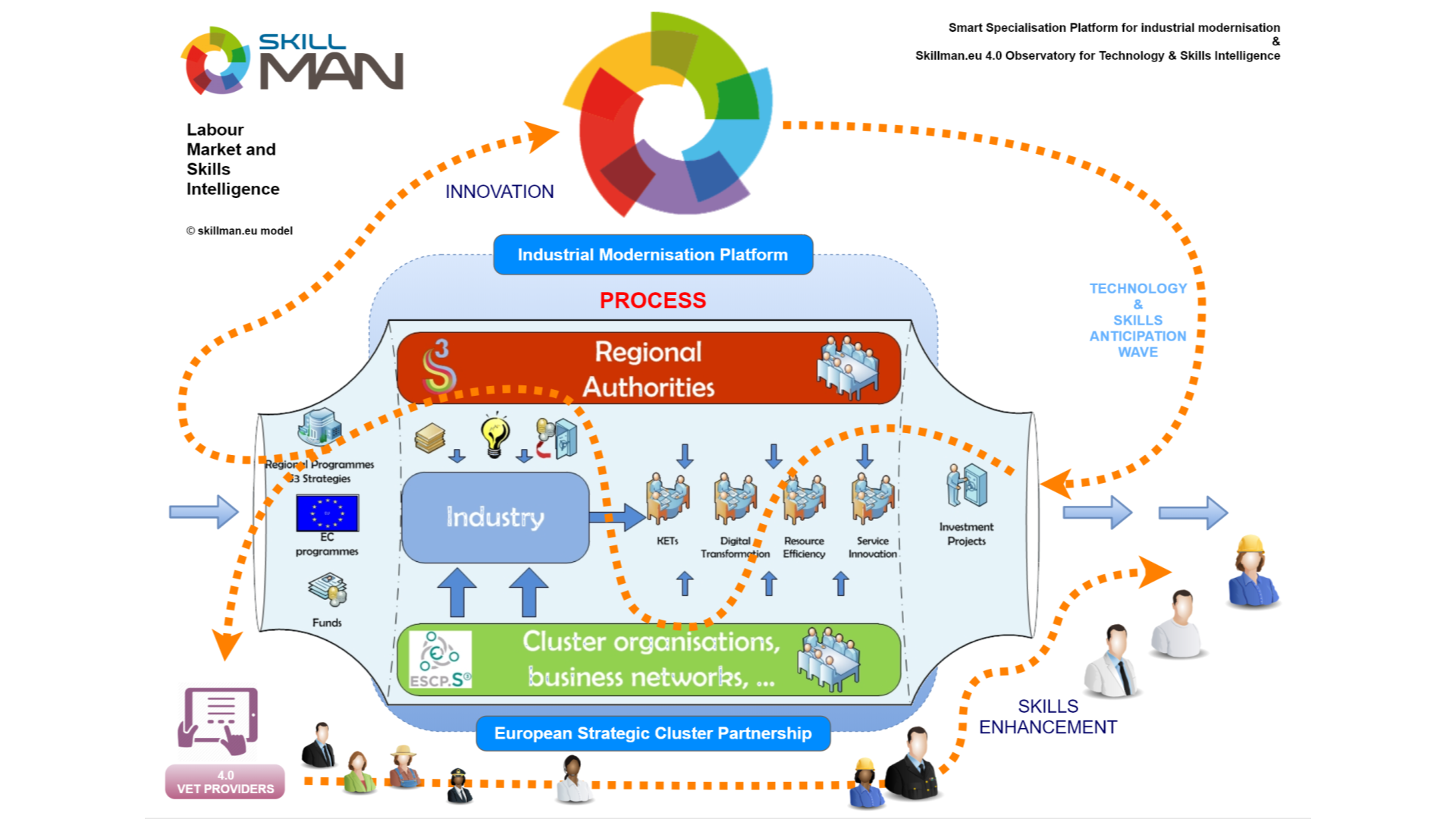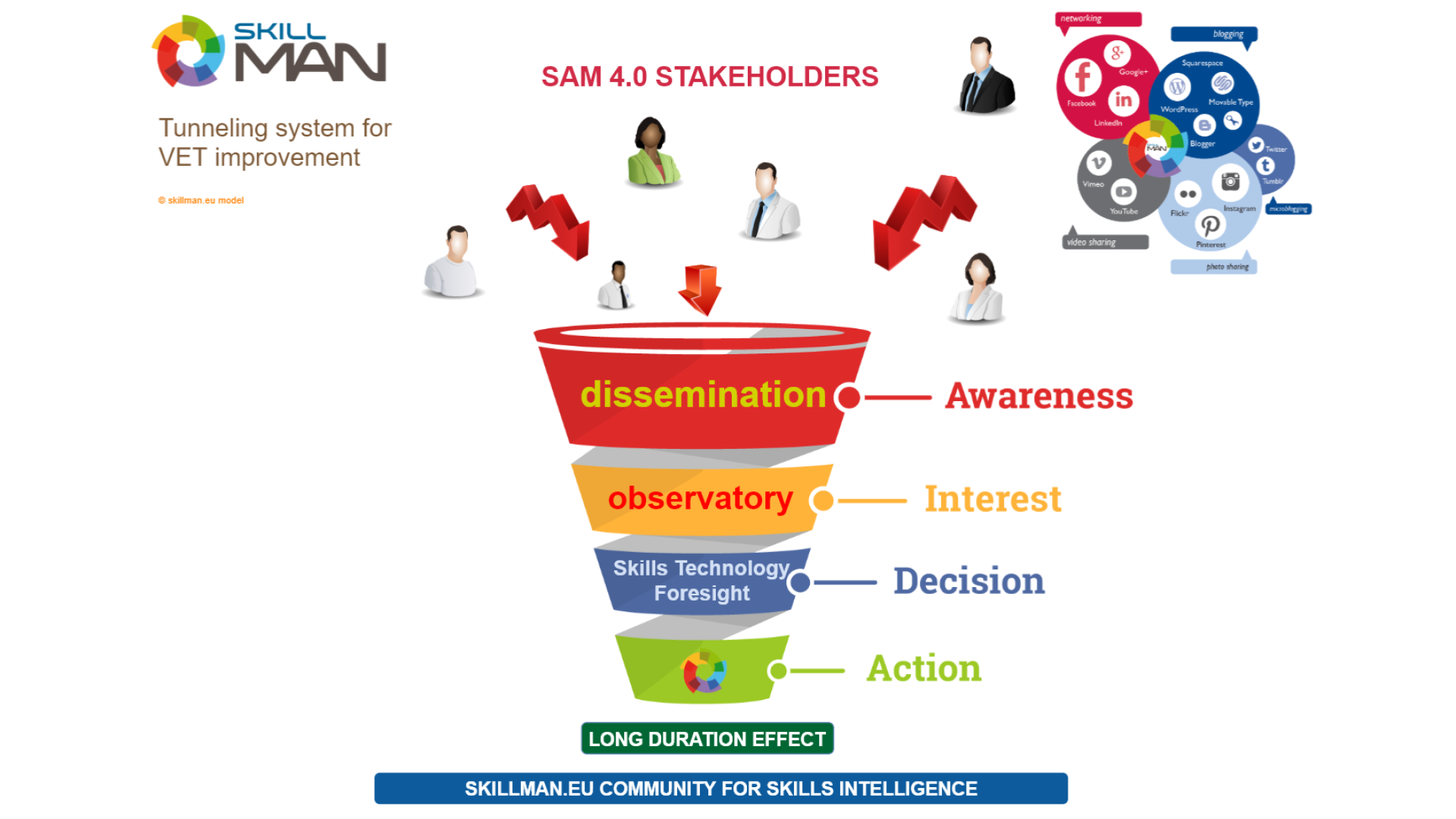Sectoral skills intelligence:
skillman.eu
Skillman.eu is the Worldwide Network for the emerging skills in Advanced Manufacturing that includes industry, training providers and other representatives of the civil society. All the new technological changes require more advanced technical skills. Employers depend not only on sufficient supply of STEM (Science, Technology, Engineering and Math) graduates, but they need staff that are both technical specialists and have the problem-solving and team-working skills necessary to adapt to rapid technological change. There is a need to introduce appropriate updated curricula in schools/universities and enable appropriate reskilling or upskilling of the workforce to ensure their effectiveness.
Skillman.eu’ skills anticipation lifecycle anticipates the skill needs in Advanced Manufacturing implementing a “systematic, future intelligence-gathering and medium to long-term vision-building process aimed at identifying opportunities and areas of vulnerability to assist present-day decision-making”. Within these processes, the experts and the stakeholders' participants' attention is pointed to a set of specific skills pillars that have to be taken into account for the analysis and thus balanced to be properly included, when possible, in the identified policy strategies and in the curricula newly designed or revised. Skillman.eu has identified its set of ‘skills pillars’ taking a priori inspiration from the EU 2020 strategies, from educational and labour trends,, from other sectoral initiatives, analysis and from the European policies in the fields of education and training and takes also into account the CEDEFOP and the ESCO developments in relation to skills needs and professional standards. The skillman.eu’s skills pillars are grouped in “critical skills”, skills related to “challenges and future trends”, "AM skills for KETs", "skills for ICT", "Green skills", "Entrepreneurial skills", and "Ethical Skills".
Skillman.eu has set its Observatory on Advanced Manufacturing Sector aiming to provide the forefront solution for the innovation and improvement of the Skills Intelligence in the sector. The Observatory implements a long-term strategy aimed to:
-
build resistant, live, bi-directional interactions with a wide range of different stakeholders
-
create a persistent system of cross-relationships for the long-duration of the skillman.eu model
-
make a concrete influence in the industry sector and in the VET system addressing policy makers, universities and technical colleges with concrete results
To make possible the more general skillman.eu anticipation lifecycle concept the Observatory implements a circular action, the ‘Skills anticipation wave’ composed by the following three moments that repeat:
-
provoking a large interest and debate
-
filtering the returning information
-
making the skills anticipation exercise possible.


The Observatory is designed in a way that:
-
provokes and sources a large debate able to stimulate a relevant interest about the skills anticipation in the sector
-
creates the necessary conditions to implement the Technology Foresight exercise and makes possible the sector skills anticipation
To provoke interest and consensus among the sector and skills needed topics, the Observatory makes publications, sign agreements of collaboration, circulates technical documents and position papers, develops the contents for the conferences, the webinars and the workshops and circulates many relevant information with the participation of the Observatory team members to a significant number of conferences and debates for an effective impact on the final targets.
To make its effect real the Observatory implements various activities and activates differentiated channels addressing diverse areas with the installation of specialised Thematic Commissions.
The Thematic Commissions are responsible for implementing on an on-going basis the animation among the stakeholders and to source their debate involving the VET practitioners’, the scientific community, the public authorities, the policy makers, the industry experts etc., focusing their attention and curiosity on the coming technologies and the needed skills and identifying and detecting all the potential sources for circulating information.
The Thematic Commissions are the operational arms of the Observatory and are planned, for the next period, to make concrete effects within the following three areas of specialization:
-
3D Printing, jetting technologies, photopolymerisation, powder bed fusion, material extru-sion, directed energy deposition.
-
Established Manufacturing industries in transition towards industrial modernisation, e.g. in-jection moulding, machining, forming and joining
-
Creative industries, e.g. industrial and graphic design, software development, 3D publish-ing.
On annual basis, the Observatory on Additive Manufacturing for the Skills Intelligence publishes:
-
The skillman.eu 4.0 Annual Position Paper on education strategies for the AM sector
-
The Skillman 4.0 European outlook on AM competences and skills needs
The publications are based on desk research, existing analysis from research bodies, including National and European Sector Skills Councils, EU Skills Panorama etc. Each Thematic Commission focuses on a specific challenge and detects its existing potential interlocutors to address them with a series of activities for sharing and interaction.
The skillman.eu Observatory is also addressed to exploiting synergy, at national and regional level, rolling-out a concrete cooperation with national and regional authorities and key stakeholders and finding possible interactions and collaborations with sister or complementary initiatives.
In general, the Observatory actively interconnects and coordinates all the skillman.eu actions and results with the existing tools and initiatives for skills development at international national and regional level.
For this process, the value of dialogue is very high and is pursued through the involvement of many different parts that, at the end, are pushed to develop new needs of networking, social interaction, mutual collaboration and support in the field of skills intelligence, foresight and curricula design.
In response to change, all relevant actors need the opportunities offered by the skillman.eu Observatory, to sit at the same table translating the strategic dialogue into enhanced government-to-government, government-to-business, and government-to-citizen cooperation and need to support their interactions within a participate mechanism of capacity building and constructions of new knowledge.
How Skillman Forms Its Proposals for a Work-Based Learning Approach
Skillman operates on a voluntary basis, and promotes a participative model and peer learning approach among its members. It pursues a sectoral skills model that includes sustainability and ethical values. Since 2014, values, principles, and solutions that the Skillman Network promotes have evolved to offer the most appropriate strategic tools to address industry needs, policies of the EU, and changes and influences coming from the international debate on education and training. During the COVID-19 pandemic, the European Commission put skills at the heart of its policy agenda, steering toward investment in people and their skills for a sustainable recovery. As a result, Skillman has recently incorporated the effects of the COVID-19 pandemic on TVET.
In 2018, some 900 stakeholders joined the Fourth Skillman International Forum where they discussed solutions to integrate TVET in local and regional strategies for growth, innovation, and competitiveness. In addition, delegates discussed strategies in relation to the large interest and collaboration that the Skillman Network was forming on the ethical responsibilities of TVET, for inclusion in renewed strategies for lifelong learning and decentralized learning approaches. During this time, the Skillman community had changed from a few dozen supporters to about 350 full partner volunteer members who, to better represent their vision and renewed composition, and in line with the latest EU trends, adopted their new definition of the Skillman Network: “Transnational platform of centres of vocational excellence for the emerging skills in advanced manufacturing” (ETF Team on Centres of Vocational Excellence 2020). The decision was taken to promote, disseminate, and encourage the community and members to act as drivers of excellence in TVET. In addition, to source and spread the Skillman vision, a Skillman magazine, CoVE—A Sectoral Skills Model that Includes Sustainability and Ethical Values, was launched, whose maiden issue was officially presented at the International Conference of Comparative and International Education Society held April 2019 in San Francisco. To define more effectively its own support plan, the European Commission launched a study, Mapping of Centres of Vocational Excellence (CoVE), on the characteristics of centers of professional excellence, which was published in November 2019 (European Commission 2019). Also in September 2019, a select group of Skillman members participated in the preparation of the Fifth Skillman International Forum, held October 2019, wherein the Skillman Network launched its Global CoVEs Framework (Crisonà et al. 2019), which is Skillman’s flagship initiative for TVET quality improvement. The Skillman systematic approach to excellence in TVET, called Self-Assessment Tool (SAT), was also launched. The SAT was designed by Skillman members as a subtle mechanism for the continuous evaluation and finetuning of 25 variables for excellence in TVET, to stimulate solid interaction and continuous learning among TVET stakeholders on the basis of concrete data. The tool represents an approach to a networked vocational training system of the future that draws stakeholders’ attention to real data in order to involve them to learn and improve from sharing standards and objectives. By 2020, for the first time, the Global CoVEs Framework had operationalized the early version of SAT,3 that promoted a shared vision on the future of excellence in TVET.
To enable a shared learning experience among TVET stakeholders as a basis for a wider network of interconnected TVET providers, the SAT aims at continuous improvement of CoVEs by targeting the progress milestones indicated in the Maturity Model for CoVE Development (European Commission 2019), and by grouping performance under three clusters:
(i) teaching and learning,
(ii) cooperation and partnerships, and
(iii) governance and financing or funding (Fig. 17.2). In the last stage of its development, SAT allows for the following (see Fig. 17.3, steps 1–3):
(i) measuring and monitoring performance over time at the individual CoVEs level; territorial level (regional, national, and continental groupings); and framework level (all Global CoVEs members);
(ii) real-time publishing of visual presentations (radar maps) and definition of individualized concrete objectives (target levels) and standard levels; and
(iii) finetuning of the 25 variables for excellence (European Commission 2019), as integrated with the variables of the evaluation matrix in the Maturity Model for CoVE Development.
(i) it allows scaling up of implementation to a large number of TVET providers and not only to the Global CoVEs members, ensuring a deep and wide impact; (ii) it allows continuous self-assessments, audits, and certifications, enabling the creation of an accreditation system for CoVEs in advanced manufacturing; (iii) it enables a transparent approach that facilitates efforts and recognition of excellence; and (iv) it produces results that ensure the success of the matchmaking exercise for the best peer learning collaboration among the members of the platform. Each of the 25 variables are positioned in different stages of development of VET excellence.
Aligning Technical and Vocational Education and Training with Innovation Systems
In 2017, the European Commission issued the Communication on Strengthening Innovation in Europe’s Regions (European Commission 2017), pointing to the need to link TVET to innovation systems as part of the EU’s smart specialization strategies at a regional level. The Skillman Network presented its vision on how to integrate the skills anticipation lifecycle to the smart specialization platforms, defining a new approach called Skills Anticipation Wave (SAW). This concept, inspired by the salmon ascent route, focuses on the importance of continuously gathering information from all the actors involved in the innovation tunnels at a regional level; acquiring the latest information so that these can be promptly included in the TVET pathways; and effectively anticipating the skills needed by the labor market.
Peer Learning Clubs
The launch of Skillman’s Global CoVEs Framework involved selected members of the network and their related stakeholders with activities, which included an important debate to contribute to the formation of the Skillman Florence Declaration, TVET for Green, Sustainable and Inclusive Development in Response to theFourth Industrial Revolution, the Emerging Needs of Industry 4.0 and Ethical Considerations (Skillman.eu 2020). The Skillman Florence Declaration was also adopted as a fundamental charter of reference for the Global CoVEs Framework.
Answering the Need for More Skilled People